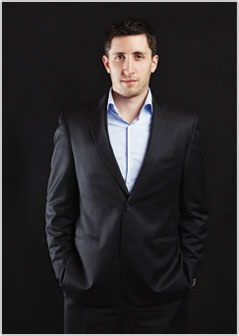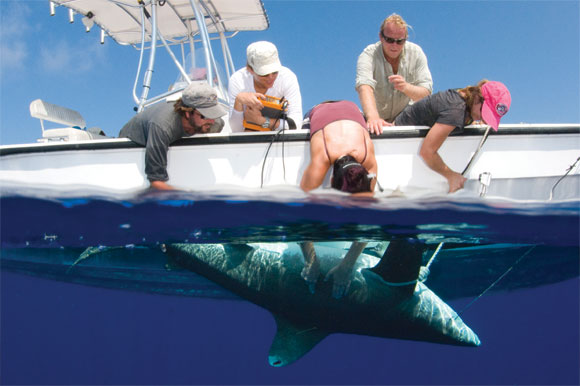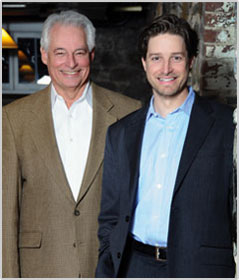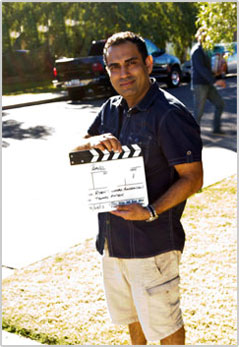ALUMNI SHORTS

Economic growth in China is a topic at the forefront of many Americans' minds, and one Virginia Tech alumnus is filling a knowledge gap caused by this growth. Robert L. Fried (communication, political science '09), a third-generation entrepreneur, co-founded the Chinese Language Institute (CLI) with his brother, Bradford Fried. Located in Guilin, China (pronounced "gwā'lin"), northwest of Hong Kong, CLI has hosted hundreds of students of all ages who have come from more than 30 countries for an immersive experience in Chinese language and culture. "More and more foreigners are moving to China to learn Chinese and take part in China's economic growth," Fried said.
While Guilin is not a bustling metropolis like Beijing or Shanghai, the city is ideally located, offering many of the perks of a big city. "The city has changed so much since we started CLI," Fried said. "We have easily quadrupled the amount of Americans who are studying in Guilin." Because CLI is officially affiliated with a local university in Guilin, students can apply their studies toward credits at their home universities.
The Fried brothers are proud to have partnered with the city. While establishing CLI, they raised private money to pave the road that leads up to CLI, which allowed local officials on the village council to maintain their autonomy over the road rather than allowing the municipal government to pave—and therefore own—the road. "We worked with the council chief and the other businesses right along the street and collected about $20,000 to have the road properly paved," Fried said. Such cooperation points to a relationship between the city and CLI that is unprecedented in the region.
The idea for CLI, born out of Fried's first study-abroad experience in Guilin with his brother, was an endeavor his professors supported. "I think it is so important for professors to be supportive of their students' crazy ideas," Fried said. "I was really fortunate to have three awesome professors at Virginia Tech, Edd Sewell, Dale Jenkins, and Helen Schneider, who all supported my project and even brought students on CLI's first China study tour in the summer of 2010."
Alex Baruch, a graduate assistant in the marketing and publications unit, is pursuing a master's degree in public administration and policy.

Referred to as "the most dangerous of all sharks" by 20th-century conservationist Jacques Cousteau, oceanic whitetip sharks were long considered relatively unstudied in comparison to other large open-ocean sharks—until Lucy Howey-Jordan (biology '04) and her research team conducted a remarkable study.
In 2010, Howey-Jordan and a group of international scientists launched a pilot study in the Bahamas using satellite-linked archival transmitters to track the movements of whitetip sharks, which have suffered an estimated 90 percent decrease in population. The team's findings, published in the February 2013 edition of the science journal PLoS ONE, not only received widespread press coverage, but also spearheaded a successful effort to protect the critically endangered species.
Learn more about the whitetip research at www.science.vt.edu/news/magazine/.

A father-and-son duo is championing adaptive reuse in the construction industry, repurposing historic properties while continuing a family tradition in sustainable construction practices. Martin Azola (civil engineering '68, M.S. '69) and Tony Azola (forestry and wildlife '97, M.S. forestry '01) , serve as the chairman/CEO and the president, respectively, of Azola and Associates Inc., a Baltimore, Md., firm established in 1966 by Martin's father, Joseph Azola.
A former jail, a clocktower, and a railway station, to name a few, have been transformed by the firm. The Azolas are currently renovating an old mansion into a boutique hotel called The Hotel Ivy. Considered a certified historic restoration by the State of Maryland, the structure offered the challenge of preserving historic charm while introducing the modern comforts that high-end customers desire.
Maintaining such a careful balance is important when restoring a historic building, and Tony Azola credits the forestry department with developing his ability to solve complex problems. "Virginia Tech definitely teaches you how to think—how to think critically, being able to think through problems," he said. "In construction, there is a new problem every day."
Although adaptive reuse has been a signature part of the family business for years, Tony Azola said Virginia Tech exposed him to the environmental concepts that influence how he manages projects. "Forestry opened my eyes up to the world. All of the garbage we make has to go somewhere, so you have to have a way to revitalize old things—especially buildings. Virginia Tech opened my eyes to these concepts of reuse and recycling, and I try to bring those principles to the job every day," he said.
Alex Baruch, a graduate assistant in the marketing and publications unit, is pursuing a master's degree in public administration and policy.

Raj Suri (computer science '97) had a spectacular Super Bowl Sunday. No, he did not bet on the Seahawks decimating the Broncos. He couldn't have cared less about the game. The part-time actor/producer made a Doritos commercial that aired during the game, America's most-watched annual TV event.
He won $1 million for his efforts, too.
Titled "Time Machine" and inspired by the comedy classic, "Back to the Future," the commercial featured a precocious boy using a cardboard time machine and a few sleight-of-hand tricks to dupe an adult passerby out of his bag of Doritos. The spot—shot during one day and costing roughly $300, with much labor donated by friends and family—was one of five fan-made ads featured in the snack brand's annual contest to produce a Super Bowl advertisement. Fans of the snack chip voted online, picking the commercial that would air.
Based in Phoenix, Ariz., Suri landed a job as a systems analyst at Intel right out of college in 1997. His hobby, however, is acting and producing.
"This whole experience is surreal. I am an amateur producer by definition. To create something that is regarded to be a superb feat in advertising is hard to wrap my head around. It's odd that people want to talk to me. But it's been fun. I do these competitions to create opportunities for myself," said Suri. "I cannot wrap my mind around the fact that our commercial was seen by 111 million people. … I'm extremely proud."
Steven Mackay is the College of Engineering's communications manager.
Produced by University Relations